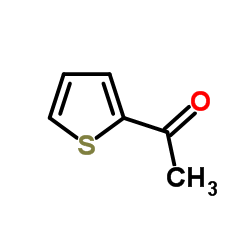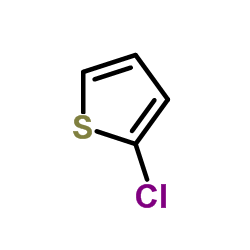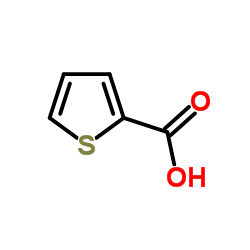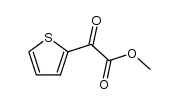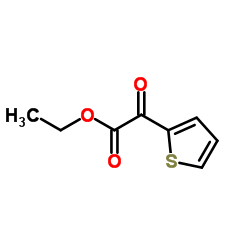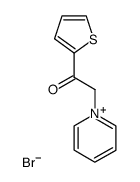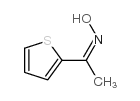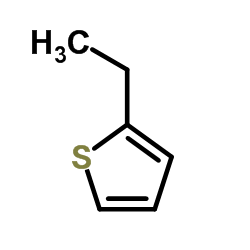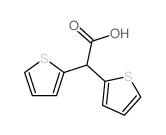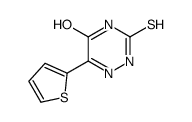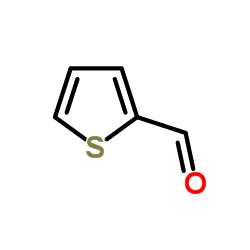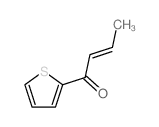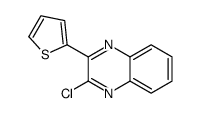4075-59-6
| 中文名 | 2-噻吩乙醛酸 |
|---|---|
| 英文名 | 2-Thiopheneglyoxylic acid |
| 中文别名 |
2-噻吩甲醯甲酸
噻吩-2-乙醛酸 |
| 英文别名 |
MFCD00005441
EINECS 223-794-2 2-Oxo-2-(thiophen-2-yl)acetic acid Oxo(2-thienyl)acetic acid 2-Thiopheneacetic acid, α-oxo- 2-oxo-2-thiophen-2-ylacetic acid |
| 密度 | 1.5±0.1 g/cm3 |
|---|---|
| 沸点 | 274.2±22.0 °C at 760 mmHg |
| 熔点 | 88-91 °C(lit.) |
| 分子式 | C6H4O3S |
| 分子量 | 156.159 |
| 闪点 | 119.7±22.3 °C |
| 精确质量 | 155.988113 |
| PSA | 82.61000 |
| LogP | 0.29 |
| 外观性状 | 黄色至绿色结晶粉末 |
| 蒸汽压 | 0.0±0.6 mmHg at 25°C |
| 折射率 | 1.606 |
| 储存条件 | 避光,通风干燥处,密封保存 |
| 稳定性 | 常温常压下稳定,黄色结晶粉未,熔点88-91℃。易溶于二氧甲烷和乙酸乙脂,不溶于石油醚和乙醚。 |
Synonym:alpha-Oxo-2-thiopheneacetic acid Section 2 - COMPOSITION, INFORMATION ON INGREDIENTS
Risk Phrases: 36/37/38 Section 3 - HAZARDS IDENTIFICATION EMERGENCY OVERVIEW
Irritating to eyes, respiratory system and skin.Hygroscopic (absorbs moisture from the air). Potential Health Effects Eye: Causes eye burns. May cause chemical conjunctivitis and corneal damage. Skin: Causes skin burns. May cause skin rash (in milder cases), and cold and clammy skin with cyanosis or pale color. Ingestion: Causes gastrointestinal tract burns. May cause perforation of the digestive tract. May cause cardiac disturbances. May cause central nervous system effects. May cause systemic effects. Inhalation: Inhalation of high concentrations may cause central nervous system effects characterized by nausea, headache, dizziness, unconsciousness and coma. Causes chemical burns to the respiratory tract. Aspiration may lead to pulmonary edema. May cause cardiac abnormalities. May cause systemic effects. Chronic: Effects may be delayed. Section 4 - FIRST AID MEASURES Eyes: Get medical aid immediately. Do NOT allow victim to rub eyes or keep eyes closed. Extensive irrigation with water is required (at least 30 minutes). Skin: Get medical aid immediately. Immediately flush skin with plenty of water for at least 15 minutes while removing contaminated clothing and shoes. Wash clothing before reuse. Destroy contaminated shoes. Ingestion: Never give anything by mouth to an unconscious person. Get medical aid immediately. Do NOT induce vomiting. If conscious and alert, rinse mouth and drink 2-4 cupfuls of milk or water. Inhalation: Get medical aid immediately. Remove from exposure and move to fresh air immediately. If breathing is difficult, give oxygen. Do NOT use mouth-to-mouth resuscitation. If breathing has ceased apply artificial respiration using oxygen and a suitable mechanical device such as a bag and a mask. Notes to Physician: Treat symptomatically and supportively. Section 5 - FIRE FIGHTING MEASURES General Information: As in any fire, wear a self-contained breathing apparatus in pressure-demand, MSHA/NIOSH (approved or equivalent), and full protective gear. During a fire, irritating and highly toxic gases may be generated by thermal decomposition or combustion. Contact with metals may evolve flammable hydrogen gas. Containers may explode when heated. Non-combustible, substance itself does not burn but may decompose upon heating to produce corrosive and/or toxic fumes. Runoff from fire control or dilution water may cause pollution. Extinguishing Media: Do NOT use water directly on fire. Use water spray to cool fire-exposed containers. Use foam, dry chemical, or carbon dioxide. Section 6 - ACCIDENTAL RELEASE MEASURES General Information: Use proper personal protective equipment as indicated in Section 8. Spills/Leaks: Vacuum or sweep up material and place into a suitable disposal container. Clean up spills immediately, observing precautions in the Protective Equipment section. Avoid generating dusty conditions. Provide ventilation. Section 7 - HANDLING and STORAGE Handling: Use only in a well-ventilated area. Minimize dust generation and accumulation. Do not breathe dust, vapor, mist, or gas. Do not get in eyes, on skin, or on clothing. Keep container tightly closed. Do not ingest or inhale. Wash clothing before reuse. Discard contaminated shoes. Storage: Keep container closed when not in use. Store in a tightly closed container. Store in a cool, dry, well-ventilated area away from incompatible substances. Corrosives area. Store protected from moisture. Section 8 - EXPOSURE CONTROLS, PERSONAL PROTECTION Engineering Controls: Facilities storing or utilizing this material should be equipped with an eyewash facility and a safety shower. Use adequate ventilation to keep airborne concentrations low. Exposure Limits CAS# 4075-59-6: Personal Protective Equipment Eyes: Wear appropriate protective eyeglasses or chemical safety goggles as described by OSHA's eye and face protection regulations in 29 CFR 1910.133 or European Standard EN166. Skin: Wear appropriate protective gloves and clothing to prevent skin exposure. Clothing: Wear appropriate protective clothing to prevent skin exposure. Respirators: Follow the OSHA respirator regulations found in 29 CFR 1910.134 or European Standard EN 149. Use a NIOSH/MSHA or European Standard EN 149 approved respirator if exposure limits are exceeded or if irritation or other symptoms are experienced. Section 9 - PHYSICAL AND CHEMICAL PROPERTIES Physical State: Powder Color: yellow to green Odor: None reported. pH: Not available. Vapor Pressure: Not available. Viscosity: Not available. Boiling Point: Not available. Freezing/Melting Point: 88.00 - 91.00 deg C Autoignition Temperature: Not applicable. Flash Point: Not applicable. Explosion Limits, lower: Not available. Explosion Limits, upper: Not available. Decomposition Temperature: Solubility in water: Specific Gravity/Density: Molecular Formula: C6H4O3S Molecular Weight: 156.16 Section 10 - STABILITY AND REACTIVITY Chemical Stability: Stable at room temperature in closed containers under normal storage and handling conditions. Conditions to Avoid: Incompatible materials, dust generation, excess heat, strong oxidants, exposure to moist air or water. Incompatibilities with Other Materials: Moisture, oxidizing agents, strong bases. Hazardous Decomposition Products: Carbon monoxide, oxides of sulfur, irritating and toxic fumes and gases, carbon dioxide. Hazardous Polymerization: Has not been reported. Section 11 - TOXICOLOGICAL INFORMATION RTECS#: CAS# 4075-59-6 unlisted. LD50/LC50: Not available. Carcinogenicity: 2-Thiopheneglyoxylic acid - Not listed by ACGIH, IARC, or NTP. Section 12 - ECOLOGICAL INFORMATION Section 13 - DISPOSAL CONSIDERATIONS Dispose of in a manner consistent with federal, state, and local regulations. Section 14 - TRANSPORT INFORMATION IATA Shipping Name: CORROSIVE SOLID, ACIDIC, ORGANIC, N.O.S.* Hazard Class: 8 UN Number: 3261 Packing Group: III IMO Shipping Name: CORROSIVE SOLID, ACIDIC, ORGANIC, N.O.S. Hazard Class: 8 UN Number: 3261 Packing Group: III RID/ADR Shipping Name: CORROSIVE SOLID, ACIDIC, ORGANIC, N.O.S. Hazard Class: 8 UN Number: 3261 Packing group: III Section 15 - REGULATORY INFORMATION European/International Regulations European Labeling in Accordance with EC Directives Hazard Symbols: XI Risk Phrases: R 36/37/38 Irritating to eyes, respiratory system and skin. Safety Phrases: S 26 In case of contact with eyes, rinse immediately with plenty of water and seek medical advice. S 37/39 Wear suitable gloves and eye/face protection. WGK (Water Danger/Protection) CAS# 4075-59-6: No information available. Canada None of the chemicals in this product are listed on the DSL/NDSL list. CAS# 4075-59-6 is not listed on Canada's Ingredient Disclosure List. US FEDERAL TSCA CAS# 4075-59-6 is not listed on the TSCA inventory. It is for research and development use only. SECTION 16 - ADDITIONAL INFORMATION N/A |
|
生态学数据: 通常对水是不危害的,若无政府许可,勿将材料排入周围环境.
|
| 符号 |

GHS05 |
|---|---|
| 信号词 | Danger |
| 危害声明 | H314 |
| 警示性声明 | P280-P305 + P351 + P338-P310 |
| 个人防护装备 | Eyeshields;Faceshields;full-face particle respirator type N100 (US);Gloves;respirator cartridge type N100 (US);type P1 (EN143) respirator filter;type P3 (EN 143) respirator cartridges |
| 危害码 (欧洲) | C:Corrosive; |
| 风险声明 (欧洲) | R34 |
| 安全声明 (欧洲) | S26-S27-S28-S36/37/39-S45 |
| 危险品运输编码 | UN 3261 8/PG 2 |
| WGK德国 | 3 |
| 包装等级 | III |
| 危险类别 | 8 |
| 海关编码 | 2934999090 |
|
~72% 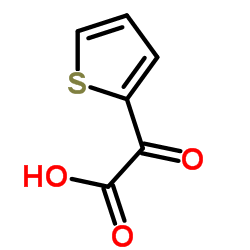
4075-59-6 |
| 文献:Liu, Jie; Liu, Qiang; Yi, Hong; Qin, Chu; Bai, Ruopeng; Qi, Xiaotian; Lan, Yu; Lei, Aiwen Angewandte Chemie - International Edition, 2014 , vol. 53, # 2 p. 502 - 506 Angew. Chem., 2014 , vol. 126, # 2 p. 512 - 516,5 |
|
~% 
4075-59-6 |
| 文献:Francalanci, F.; Bencini, E.; Gardano, A.; Vincenti, M.; Foa, M. Journal of Organometallic Chemistry, 1986 , vol. 301, p. C27 - C30 |
|
~% 
4075-59-6 |
| 文献:Chen, Chien-Tien; Bettigeri, Sampada; Weng, Shiue-Shien; Pawar, Vijay D.; Lin, Ya-Hui; Liu, Cheng-Yuan; Lee, Way-Zen Journal of Organic Chemistry, 2007 , vol. 72, # 22 p. 8175 - 8185 |
|
~% 
4075-59-6 |
| 文献:Enders, Dieter; Stoeckel, Bianca A.; Rembiak, Andreas Chemical Communications, 2014 , vol. 50, # 34 p. 4489 - 4491 |
|
~% 
4075-59-6 |
| 文献:Steinkopf; Thormann Justus Liebigs Annalen der Chemie, 1939 , vol. 540, p. 1,5 |
|
~% 
4075-59-6 |
| 文献:Kroehnke Chemische Berichte, 1947 , vol. 80, p. 298,310 |
|
~% 
4075-59-6 |
| 文献:Steinkopf; Thormann Justus Liebigs Annalen der Chemie, 1939 , vol. 540, p. 1,5 |
|
~% 
4075-59-6 |
| 文献:Egli Chemische Berichte, 1885 , vol. 18, p. 544 |
|
~% 
4075-59-6 |
| 文献:Steinkopf; Wolfram Justus Liebigs Annalen der Chemie, 1924 , vol. 437, p. 25,31, 32 |
| 上游产品 10 | |
|---|---|
| 下游产品 9 | |
| 海关编码 | 2934999090 |
|---|---|
| 中文概述 | 2934999090. 其他杂环化合物. 增值税率:17.0%. 退税率:13.0%. 监管条件:无. 最惠国关税:6.5%. 普通关税:20.0% |
| 申报要素 | 品名, 成分含量, 用途 |
| Summary | 2934999090. other heterocyclic compounds. VAT:17.0%. Tax rebate rate:13.0%. . MFN tariff:6.5%. General tariff:20.0% |


